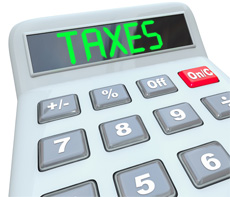Singapore Tax Filing Calendar
When must I file my Singapore taxes?

Whether you are an individual or a corporate entity, knowing when to file your taxes will be essential, particularly if you want to avoid paying penalties or the horror of dealing with a court summons.
Rikvin, a professional firm specialising in tax and accounting services, provides a comprehensive guide on when and how individuals and corporate entities should compute and file their taxes.
Personal Tax – What Do I Need to Know?
Singapore’s Personal Tax system is a progressive tax system where the tax percentage charge depends on an individual’s taxable income. To put it simply, individuals with higher annual chargeable incomes will pay a higher percentage of tax.
If you fulfill any of the criteria below, you would be considered as a tax resident by the Inland Revenue Authority of Singapore (“IRAS”):-
- A Singapore citizen who normally resides in Singapore except for temporary absences;
- Permanent Resident who has established a permanent home in Singapore; or
- Foreigner who has stayed or worked in Singapore for 183 days or more in the prior year
However, there are exceptions. For example, if one is a Singapore Citizen or Permanent Resident who has worked and lived overseas for a period of time, your overseas income will not need to be declared and will not be taxable, even if this income is credited to a Singapore bank account.
To understand more about how you may qualify for this exemption, do seek the advice of a professional tax agent, who would be able to advise you accordingly.
Related Read: 7 Ways to Legally Reduce Income Tax in Singapore (2023)
How Do I Compute my Personal Tax?

How much tax one has to pay is contingent on your total chargeable income, which is your annual chargeable income before CPF deductions. Thereafter, if you qualify for tax reliefs, deduct the tax reliefs from the annual chargeable income, before computing your tax based on the corresponding tax rate that you have to pay.
Use Our Free Singapore Personal Income Tax Calculator
From YA 2024, the top marginal personal income tax rate will be raised to attain more progressivity. Both the chargeable income in excess of $500,000 up to $1 million and that in excess of $1 million will increase from 22% to 23% and 24% respectively. A side by side comparison of the Personal Income Tax rates is depicted below:
| Chargeable Income | Rate % for YA 2024 Onwards | Gross Tax Payable ($) |
|---|---|---|
| First $20,000 Next $10,000 |
0 2 |
0 200 |
| First $30,000 Next $10,000 |
– 3.5 |
200 350 |
| First $40,000 Next $40,000 |
– 7 |
550 2,800 |
| First $80,000 Next $40,000 |
– 11.5 |
3,350 4,600 |
| First $120,000 Next $40,000 |
– 15 |
7,950 6,000 |
| First $160,000 Next $40,000 |
– 18 |
13,950 7,200 |
| First $200,000 Next $40,000 |
– 19 |
21,150 7,600 |
| First $240,000 Next $40,000 |
– 19.5 |
28,750 7,800 |
| First $280,000 Next $40,000 |
– 20 |
36,550 8,000 |
| First $320,000 Next $180,000 |
– 22 |
44,550 39,600 |
| First $500,000 Next $500,000 |
– 23 |
84,150 115,000 |
| First $1,000,000 In excess of $1,000,000 |
– 24 |
199,150 |
What Kind of Tax Reliefs can I apply for?

There are various tax reliefs that can be applied for, which include, but are not limited to the following:
- Earned Income Relief
- Spouse/Handicapped Spouse Relief
- Qualifying Child/Handicapped Child
- Handicapped Brother/Sister Relief
- Parent / Handicapped Parent Relief
- Grandparent Caregiver Relief
- Working Mother’s Child Relief (WMCR)
- CPF Relief for Employees
- Life Insurance Relief
- Course Fees Relief
- NSmen, NSman Wife and NSman Parent Relief
- Foreign Maid Levy Relief
- Supplementary Retirement Scheme Relief
- CPF Cash Top-up Relief
- CPF Relief for Self-employed
- CPF Relief for Compulsory & Voluntary MediSave Contributions
For several of these tax reliefs, there is a list of conditions to be fulfilled before one can apply for the tax relief. A summary of these conditions is provided below:
| Type of Tax Relief | Automatically granted by IRAS? | Qualifying Conditions |
|---|---|---|
| Earned Income Relief | Yes | Taxable income earned from any of these sources in the preceding year:
|
| Spouse/Handicapped Spouse Relief | No | Must have supported spouse and satisfied all of these conditions:
|
| Foreign Maid Levy Relief | No | Must have hired a foreign domestic worker in the preceding yearMust satisfy any of these 3 conditions in the preceding year:
Note that this relief can only be used to offset earned income |
| CPF Relief for Employees | No | Must make compulsory employee CPF contributions under the CPF Act or to an approved pension/provident fund |
| CPF Relief for Self-employed | No | Must be a self-employed individual who has performed compulsory MediSave contributions and voluntary CPF contributions in the preceding year
Must have assessable net trade income |
| Qualifying Child Relief (QCR)/Handicapped Child Relief (HCR) | No | Must be a parent maintaining an unwed child satisfying all these conditions in the preceding year:
|
| Life Insurance Relief | No | Must satisfy all these conditions (effective YA 2023):
No relief will be given for insurance premiums paid on medical and investment policies, children’s life assurance policies and insurance premiums paid by a married woman on her husband’s life assurance policies. |
| Working Mother Child Relief (WMCR) | No |
|
| SRS Relief | Yes | SRS contributions must be made by 31 December of the preceding year
Must be a tax resident for the YA |
Once you have determined which tax reliefs you can apply for, you can apply accordingly for the relevant tax reliefs. In Singapore, the tax filing season for individuals is from March to April and it is highly recommended that individuals choose to do so via online application.
| 15 April | Personal income tax filing deadline via paper mail |
|
| 18 April | Personal income tax filing deadline via online application (e-filing) |
Corporate Tax – What Do I Need to Know?
 Singapore has adopted a one-tier corporate tax system and tax paid by a company on its chargeable income is the final tax. A company’s corporate tax is calculated based on the net income earned by companies while exercising their business activities in the period of one business year.
Singapore has adopted a one-tier corporate tax system and tax paid by a company on its chargeable income is the final tax. A company’s corporate tax is calculated based on the net income earned by companies while exercising their business activities in the period of one business year.
There are three main tax obligations that companies will have to pay attention to, as follows:-
- Filing of Estimated Chargeable Income (“ECI”)
- Corporate Income Tax – Form C-S/Form C-S (Lite) or Form C
- Filing of Goods and Services Tax (“GST”) payment
For the ECI and GST, the deadline for companies is dependent on its financial year end or accounting period, very much like the deadline for when a company’s Annual General Meeting (“AGM”) is due.
For Form C-S/Form C-S (Lite)/Form C, this is more similar to a Personal Income Tax and all companies will have to comply with the same due date as this is computed based on the Year of Assessment (“YA”), rather than the company’s own financial year end.
Related Read: 5 Reasons to Outsource Your Corporate Tax Filing in Singapore
Filing of ECI
A company’s ECI is computed based on an estimate of the company’s taxable income (after deducting tax-allowable expenses) for a YA. All companies are required to file their ECI, even if their estimated ECI is zero.
Companies that are exempted from filing their ECI would need to fulfill both conditions:
- Annual revenue of S$5 million and below for the FA
- ECI is NIL for the YA
In addition, certain entities such as real estate investment trusts (“REITs”), foreign universities, designated unit trusts etc. are not required to file ECI.
All companies are required to file their ECI within three months from their financial year end. Read Rikvin’s guide on ECI to find out more!
Filing Corporate Income Tax – Form C-S/Form C-S (Lite)/Form C
Depending on your company type, your company will need to submit either a Form C-S/C-S (Lite)/C to IRAS. The table below provides a quick overview of the differences between the 3 forms.
| Form C-S | Form C-S (Lite) | Form C | |
|---|---|---|---|
| Revenue Conditions |
|
|
|
| Other Qualifying Conditions |
|
N/A | |
| Submitting Supporting Documents | Do not need to declare essential tax and financial information | Must declare essential tax and financial information | |
| Filing Deadline | 30 November | ||
Filing of GST Payment
GST is basically Singapore’s version of VAT in the European countries. Unlike the ECI, only companies that are GST-registered businesses will need to file their GST payments. Understand what it means to be a GST-registered business when you read Rikvin’s comprehensive guide.
While ECI filing is due only once a year, after a company’s financial year end, GST filing is due every quarter, as shown in the table below:
| GST accounting period | Filing and payment due date | Filing due date | Payment deduction date |
|---|---|---|---|
| Jan – Mar | 30 Apr | 30 Apr | 15 May |
| Apr – Jun | 31 Jul | 31 Jul | 15 Aug |
| Jul – Sept | 31 Oct | 31 Oct | 15 Nov |
| Oct – Dec | 31 Jan | 31 Jan | 15 Feb |
To help companies avoid penalties and the consequences of missing their GST filing deadlines, IRAS has allowed companies to opt for a GIRO plan, where GST payments will be automatically deducted. However, companies should ensure that their accounts have sufficient payment before the payment deduction date.
Payment is deducted on the 15th of the month after the payment due date. If deduction is unsuccessful, the GIRO arrangement will be cancelled, and you must make full tax payment at the myTax Portal or re-activate the GIRO arrangement.
It is possible to apply for an extension of time, however, this request must be submitted to ACRA before the filing due date; and is subject to IRAS’ discretion. IRAS will typically review the reason and supporting documentation. The maximum extension allowed for is only two weeks.
Related Read: What is Tax Evasion, and How Do I Avoid Committing it in Singapore?
Need help filing your taxes online?
Let us do the work for you. At Rikvin, we perform personal and corporate tax filing precisely and well before the deadline.

